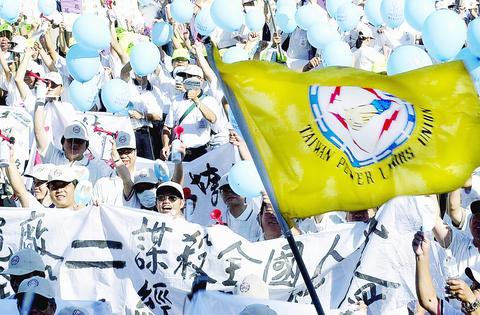President Chen Shui-bian (
In his opening remark at the anti-nuclear convention in Taipei, Chen said the future of the plant would be decided by the people through a referendum, which would be held no later than the March presidential election.
Chen said the two decades of controversy over the plant have taken too great a toll on society.

PHOTO: SEAN CHAO, TAIPEI TIMES
"I believe the public has been fully aware of information about the plant. It's time for people to make a final decision through a referendum," Chen said.
He said the referendum is a right of citizens and would strengthen parliamentary politics.
"This right can't be deprived or limited by any country, political party or person," Chen said.
He stressed that holding a referendum on the plant would fulfill a promise made by the DPP.
"We do so based on concerns about Taiwan's future energy policy and sustainable development rather than for the establishment of a legal basis for related laws mandating referendums," Chen said.
Chen said going nuclear-free reflects both an adjustment of values and a choice of lifestyle.
He said the country should promote energy conservation and the adoption of renewable energy in order to ensure environmental sustainability.
In addition, Chen said problems with the relocation of nuclear waste stored on Orchid Island would be solved by the end of the year.
Chen said the power plant isn't the only policy that can be put to a referendum.
Cabinet Spokesman Lin Chia-lung (
Minister without Portfolio Hsu Chih-hsiung (
Residents of Kungliao, where the controversial plant is being built, said at the conference that a regional referendum held in 1994 in the township suggested that 96 percent of residents are against the plant.
If free access to information on the plant and transparency of the decision-making process remain unavailable, the nationwide referendum would sacrifice Kungliao for economic development, said Wu Wen-tung (吳文通), spokesman for the Kungliao-based Yenliao Anti-Nuclear Self-Help Association.
At the conference, topics included strategies to phase out nuclear energy, the decommissioning of existing nuclear plants, the adoption of renewable energy and the disposal of nuclear waste. The experiences of the US, Japan and Sweden were also presented.
Meanwhile, blasting air horns and waving signs, more than 1,000 employees of state-run Taiwan Power Company demonstrated outside the convention, expressing their opposition to the planned phase-out of nuclear energy.
"The referendum should not be applied to the ongoing project," Taiwan Power Labor Union Director-General Shih Chao-hsien (施朝賢) said.
Shih said that terminating the project would cause at least NT$150 billion in financial losses.
Anti-nuclear activists, meanwhile, said halting construction of the plant was the first step toward making the nation nuclear-free. They urged the government to freeze the budget for the new plant and to enhance security at the three operational nuclear plants.
Also see stories:

FALSE DOCUMENTS? Actor William Liao said he was ‘voluntarily cooperating’ with police after a suspect was accused of helping to produce false medical certificates Police yesterday questioned at least six entertainers amid allegations of evasion of compulsory military service, with Lee Chuan (李銓), a member of boy band Choc7 (超克7), and actor Daniel Chen (陳大天) among those summoned. The New Taipei City District Prosecutors’ Office in January launched an investigation into a group that was allegedly helping men dodge compulsory military service using falsified medical documents. Actor Darren Wang (王大陸) has been accused of being one of the group’s clients. As the investigation expanded, investigators at New Taipei City’s Yonghe Precinct said that other entertainers commissioned the group to obtain false documents. The main suspect, a man surnamed

DEMOGRAPHICS: Robotics is the most promising answer to looming labor woes, the long-term care system and national contingency response, an official said Taiwan is to launch a five-year plan to boost the robotics industry in a bid to address labor shortages stemming from a declining and aging population, the Executive Yuan said yesterday. The government approved the initiative, dubbed the Smart Robotics Industry Promotion Plan, via executive order, senior officials told a post-Cabinet meeting news conference in Taipei. Taiwan’s population decline would strain the economy and the nation’s ability to care for vulnerable and elderly people, said Peter Hong (洪樂文), who heads the National Science and Technology Council’s (NSTC) Department of Engineering and Technologies. Projections show that the proportion of Taiwanese 65 or older would

Democracies must remain united in the face of a shifting geopolitical landscape, former president Tsai Ing-wen (蔡英文) told the Copenhagen Democracy Summit on Tuesday, while emphasizing the importance of Taiwan’s security to the world. “Taiwan’s security is essential to regional stability and to defending democratic values amid mounting authoritarianism,” Tsai said at the annual forum in the Danish capital. Noting a “new geopolitical landscape” in which global trade and security face “uncertainty and unpredictability,” Tsai said that democracies must remain united and be more committed to building up resilience together in the face of challenges. Resilience “allows us to absorb shocks, adapt under

Taiwan Semiconductor Manufacturing Co (TSMC, 台積電) yesterday said it is building nine new advanced wafer manufacturing and packaging factories this year, accelerating its expansion amid strong demand for high-performance computing (HPC) and artificial intelligence (AI) applications. The chipmaker built on average five factories per year from 2021 to last year and three from 2017 to 2020, TSMC vice president of advanced technology and mask engineering T.S. Chang (張宗生) said at the company’s annual technology symposium in Hsinchu City. “We are quickening our pace even faster in 2025. We plan to build nine new factories, including eight wafer fabrication plants and one advanced